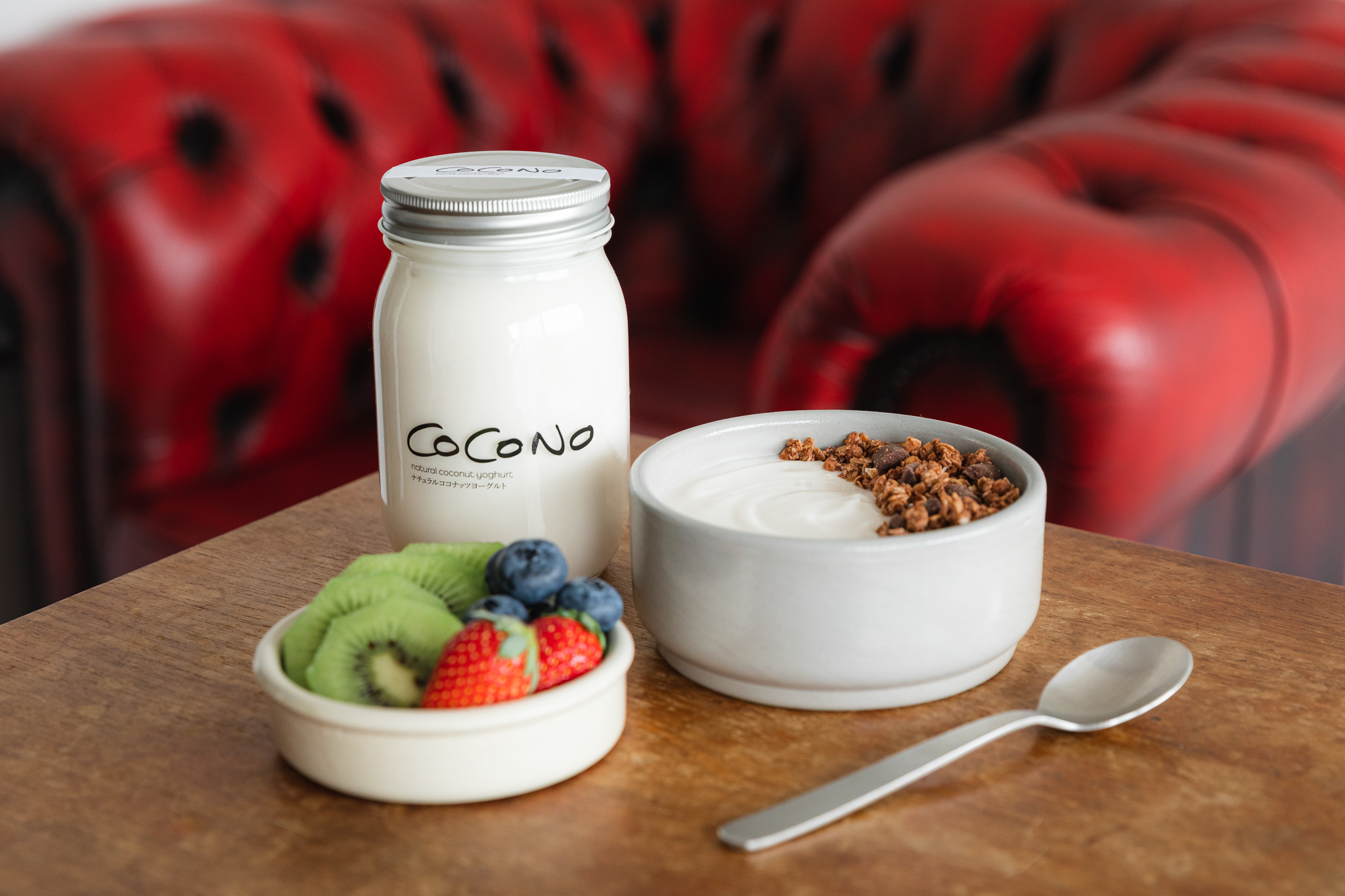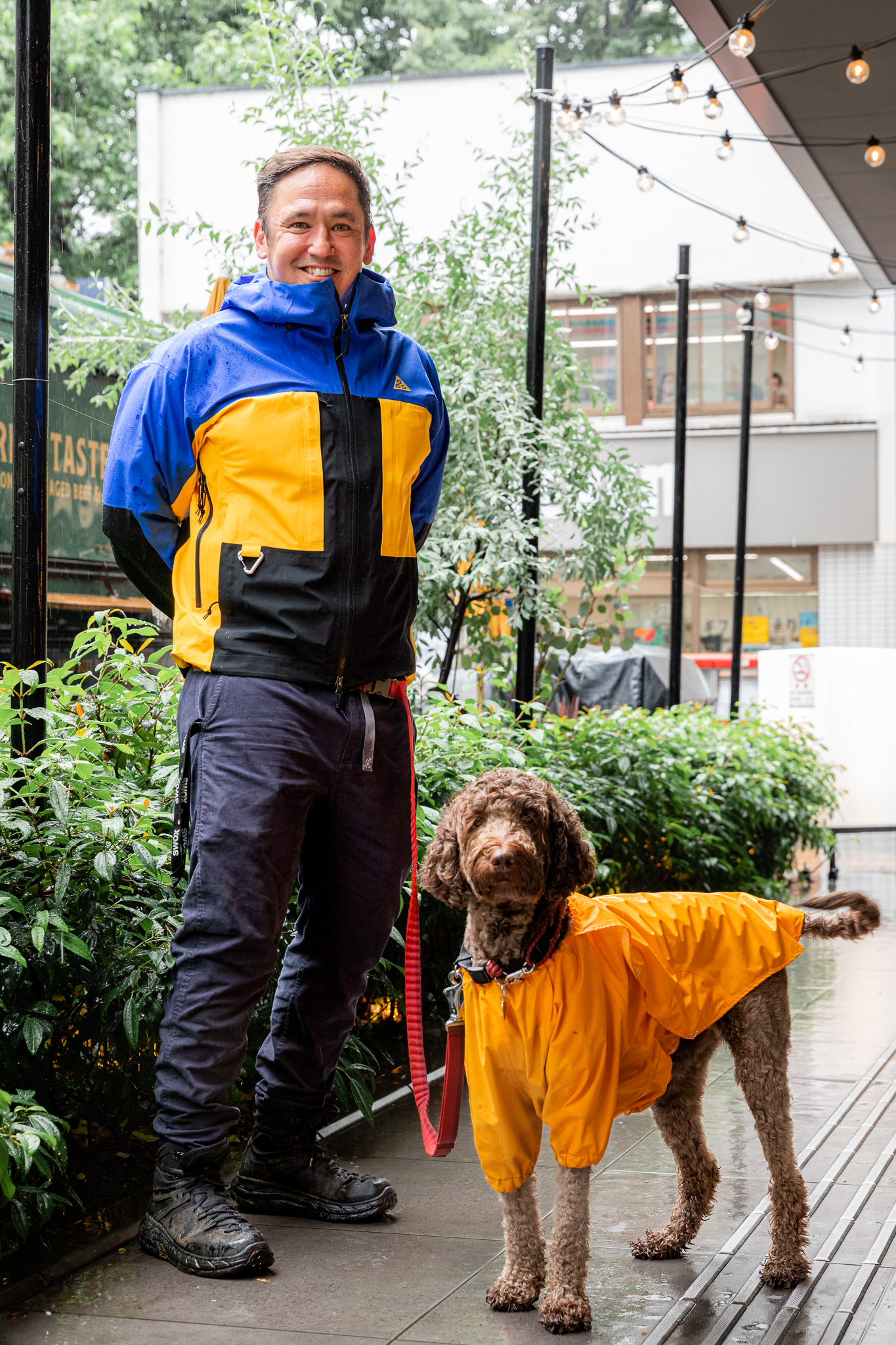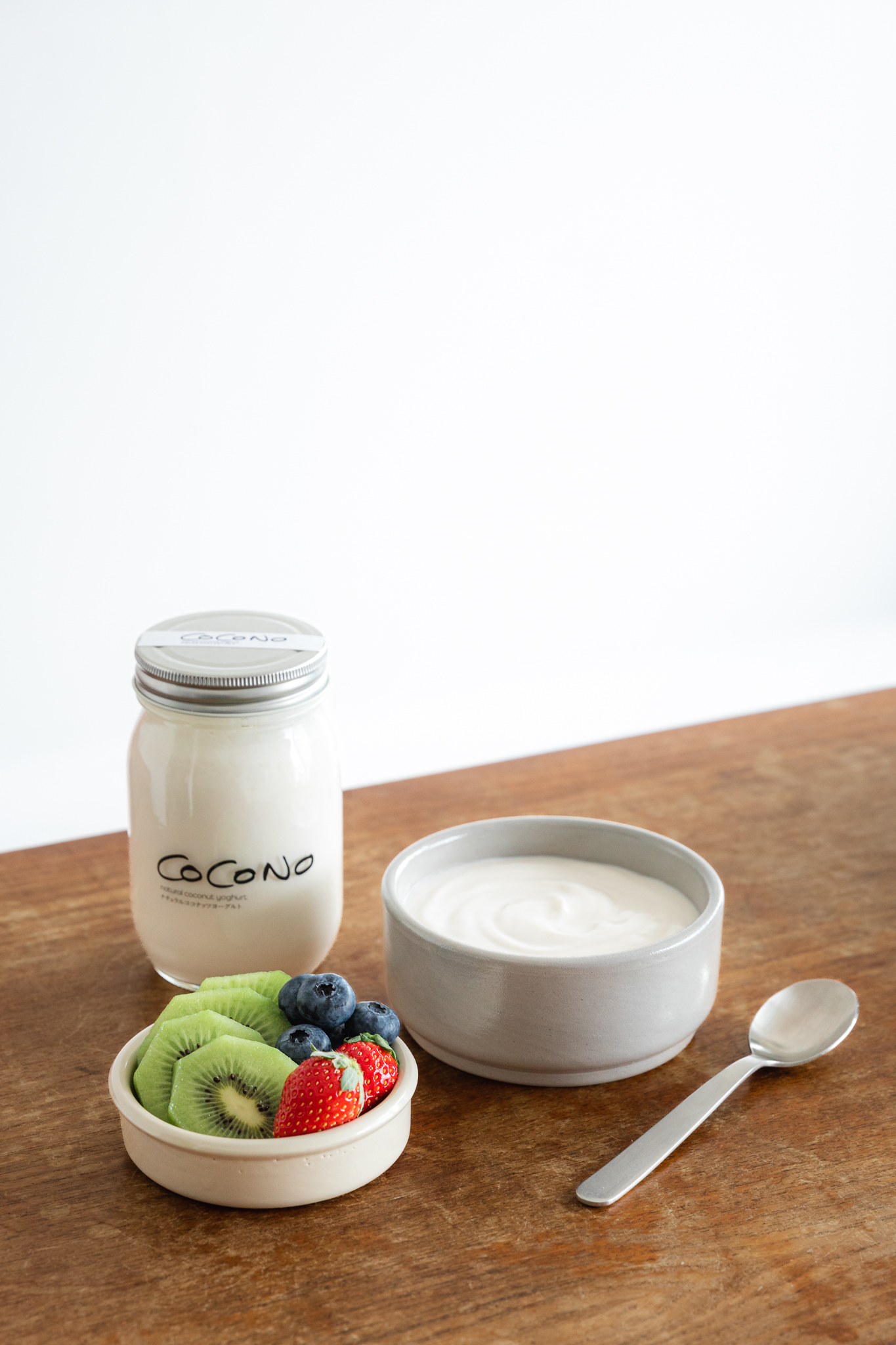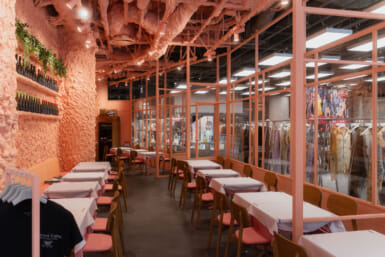Tokyoite Justin Mackee recalls fondly the Japanese catering business he co-founded in London with a former partner while in his 20s. “It was the hardest I’ve ever worked in my life, for the least amount of money. But I enjoyed it so much. I would think back to that time often, even today.” Food has always been a passion for Mackee, and throughout his life, he has flirted with ideas for food businesses while working a corporate job.
In 2020, he sought comfort in food once again and started Let Tokyo Eat Cake, a solo charitable delivery service of banana carrot cake. All proceeds were donated to charities like Second Harvest Japan and local children’s cafés. At a time when social distancing was the norm and human contact was minimal, Mackee delivered hope alongside homemade goods.
Let Tokyo Eat Cake was the springboard for Cocono, now one of Tokyo’s most celebrated dairy-free yogurt brands. Thanks to the encouraging words of friends and a loyal customer base, Mackee dared to revisit one of his earlier business ideas, but this time, he had an additional self-imposed challenge: This new product had to have as minimal a carbon footprint as possible, and, consequently, be as local as possible.
Mackee wanted the name of this new product to reflect his philosophy. “I wanted a brand that could go beyond coconut yogurt. A name that is nice to say and also easy for Japanese people to pronounce,” he says. It started with the phrase “koko no mono,” which loosely translates to “this thing from here” and, of course, hints at his product being made locally. The phrase then developed into “koko no Tokyo” before finally becoming, simply, Cocono.
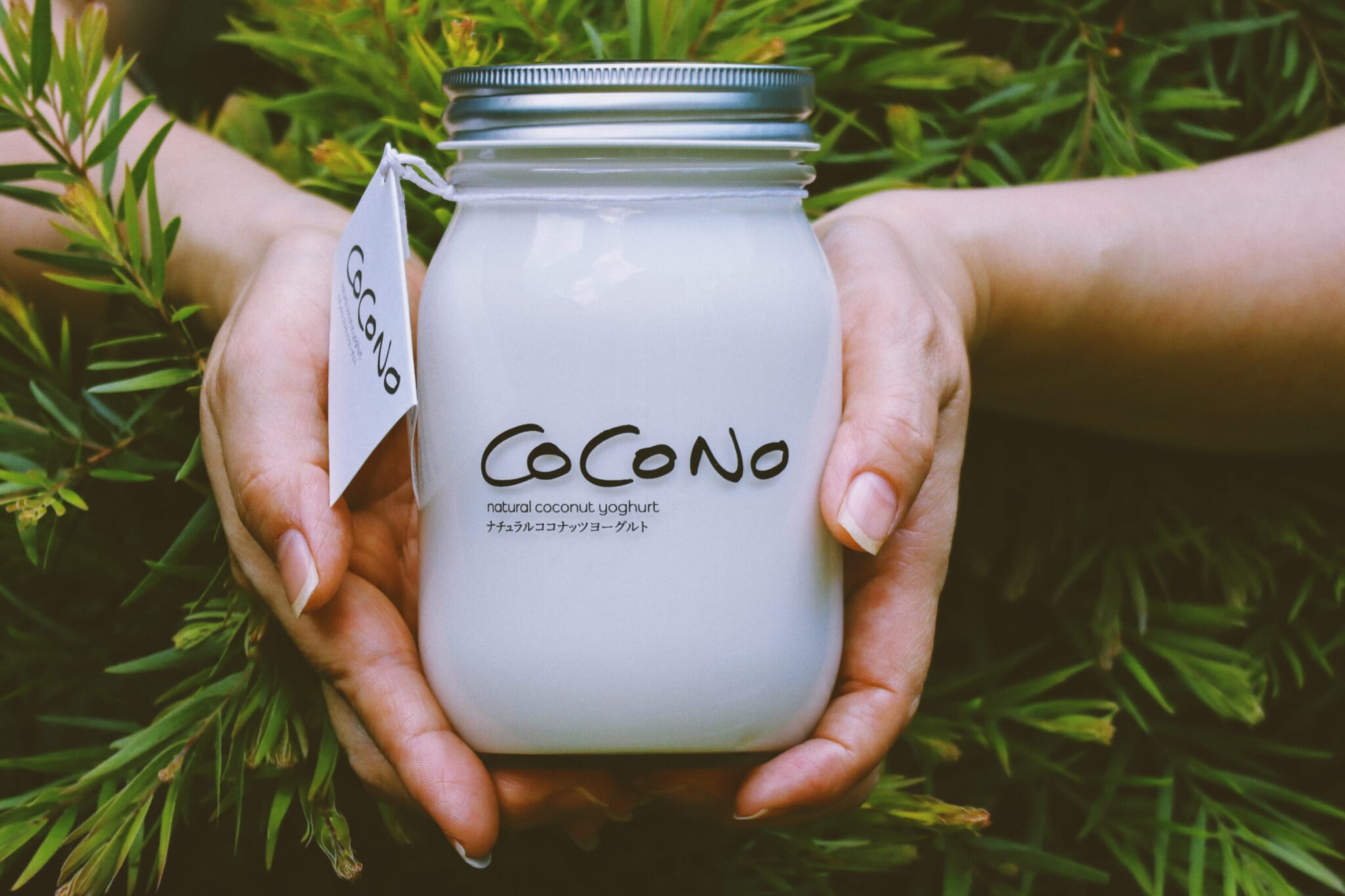
Daily Dairy Without Consequences
The lactose-free dairy products industry is a growing one, especially in Asia where a surprisingly large portion of the population is lactose intolerant. DSM, a global science-based company focused on nutrition, health and bioscience, reported that there are estimated to be “at least forty times more people suffering from lactose intolerance in an Asian country like Vietnam than in a north European country like Denmark.”
In Japan, an estimated average of 73% of the population is lactose intolerant. This doesn’t mean the average Japanese can’t consume dairy; instead, it means that people need to moderate their intake of dairy products to avoid gut issues.
“A lot of people eat yogurt in Japan, probably more than you think,” says Mackee. His Japanese grandmother, he shares, had yogurt for breakfast every day, even with an undiagnosed but apparent dairy intolerance.
“I didn’t realize I, too, have a dairy intolerance because I got used to feeling terrible after drinking milk or eating cheese,” Mackee says, explaining that typical meals in the U.K. include a substantial amount of dairy. “The first time I had coconut yogurt was in Australia, and it blew my mind that I felt completely fine afterward.”
At the moment, Cocono offers a single product: natural yogurt handmade with only four ingredients (coconut milk, probiotics, agar and konjac flour). This yogurt is thick — perhaps much thicker than the commercially available yogurt you’re familiar with — yet the flavor is bright and tart. You can have it on its own, but Cocono customers swear it’s better served alongside crunchy granola and fresh fruit.
“The goal of Cocono is to be a delicious Japanese plant-based brand,” says Mackee. “We’re also not trying to emulate the taste of non-vegan food. My vision for our yogurt and for any future products is food that’s delicious that just happens to be plant-based.”
Keeping a Clean Conscience
Cocono’s sustainability approach is imperative, and this extends to packaging. At first, Mackee wasn’t entirely sure what he was after, but he did know one thing: He didn’t want single-use plastics anywhere near his product.
“Glass jars are what we use right now, and I think it’s a better option,” he says. “The disadvantages are that they are expensive, heavy and our factories are unable to reuse them. I do collect them and donate them to farm shops and children’s cafés where they can be used, but we are constantly working on improving the packaging.”
Mackee believes paper is the key to reducing costs and making the product more accessible so more people can enjoy Cocono. The biggest challenge has been convincing Japanese manufacturers that their paper containers and lids — the same packaging often used for ice cream — can be used for yogurt.
“I could easily work with a manufacturer in China, but that’s not keeping it local,” says Mackee, who explains that many advised him to introduce environmentally sustainable initiatives only after getting Cocono off the ground. “In my experience, if you start with the easier and more profitable option, it will be hard to change down the line.”
He admits that paper packaging, which uses plastic film, isn’t a perfect solution. But, he says, it’s a start, and Cocono could be a paper-packaged yogurt pioneer. “I’m still at the point in this business life cycle where I have control over these decisions. The least you can do, I think, is to adhere to your own principles.”
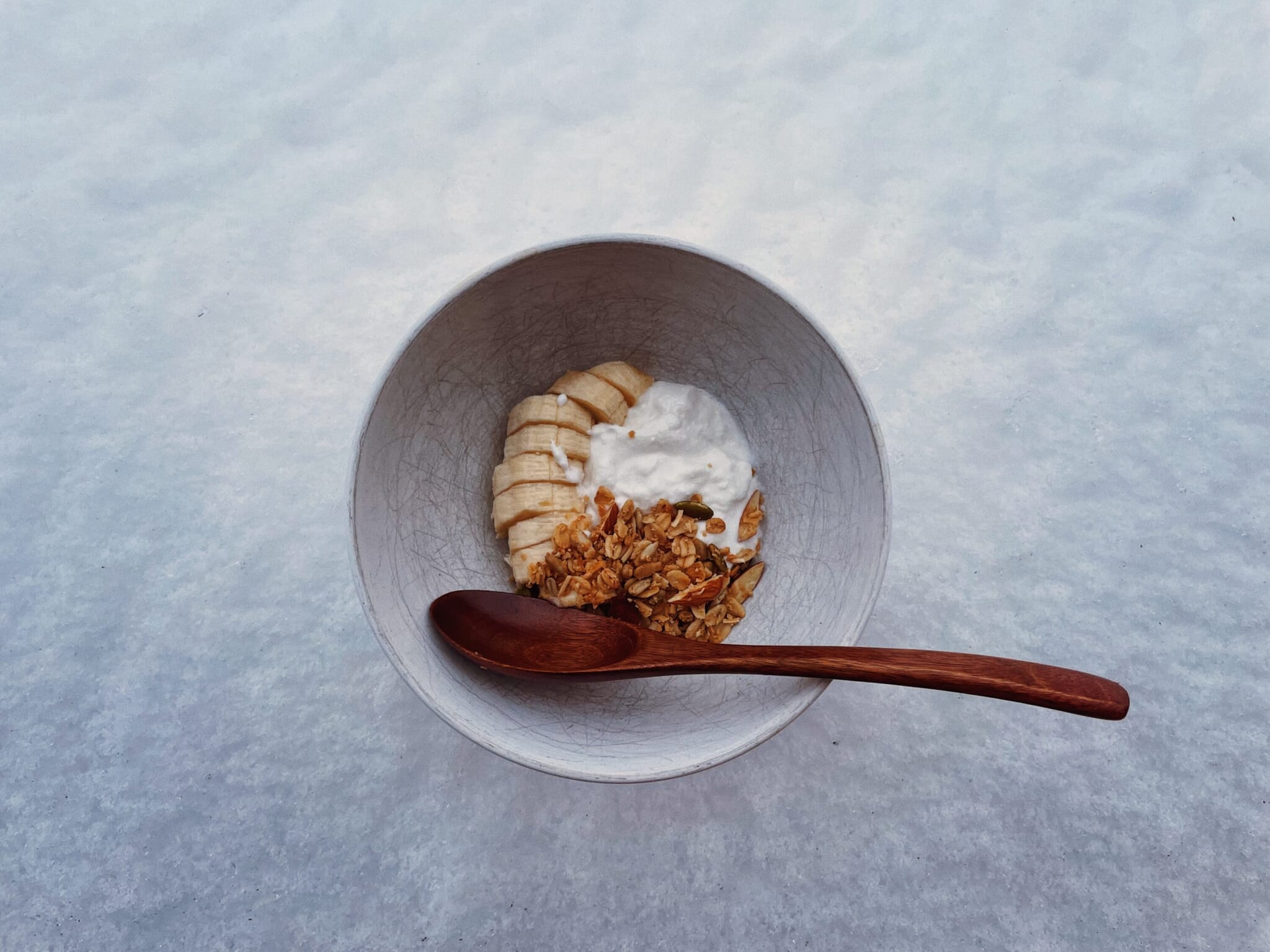
Too Good To Keep to Yourself
Cocono’s happy customers do not hesitate to feature the yogurt online. Through social media, Mackee has seen his beloved coconut yogurt in the hands of everyone from high-end restaurants and Michelin-starred chefs to food influencers and average folks in Tokyo. Mackee never asks people to share Cocono and has never paid anyone to do so.
“I think consumers are astute enough nowadays to see through whether someone is promoting something because they were paid to or because they genuinely like it. And I believe if they like it, they’ll share it. If they don’t, it’s not a problem.”
Pop-up shops and stands have also played a big role in establishing the brand’s name in the consumer space. You can find Cocono at the weekly Aoyama Farmers Market alongside friends of the brand and other thoughtfully produced food products. Independent grocery stores like Alishan Park in Yoyogi and National Azabu in Minami-Azabu also stock Cocono. If you’re traveling to Tokyo and staying at Andaz Tokyo in Toranomon, you’ll see Cocono among the hotels’ breakfast buffet offerings.
Mackee hopes to introduce different types of yogurt into his product lineup. He envisions a vanilla coconut yogurt sold in smaller formats for children to enjoy and is toying with the idea of a functional drink that tastes good and also provides plenty of nutritional benefits. In addition to thinking up new products, he continues to push the boundaries of environmentally friendly packaging, staying local and providing Tokyoites with more eco-friendly options.
“I’m still learning as I go — about producing food and about sustainability. But my idea has always been that, if this is going to be a new brand, it needs to be better for the future.”
Learn more about Cocono and purchase a jar or follow the brand on Instagram at @coconotokyo.

